Top Vitamins for Radiant Skin and a Natural Glow in 2025
Table of Contents
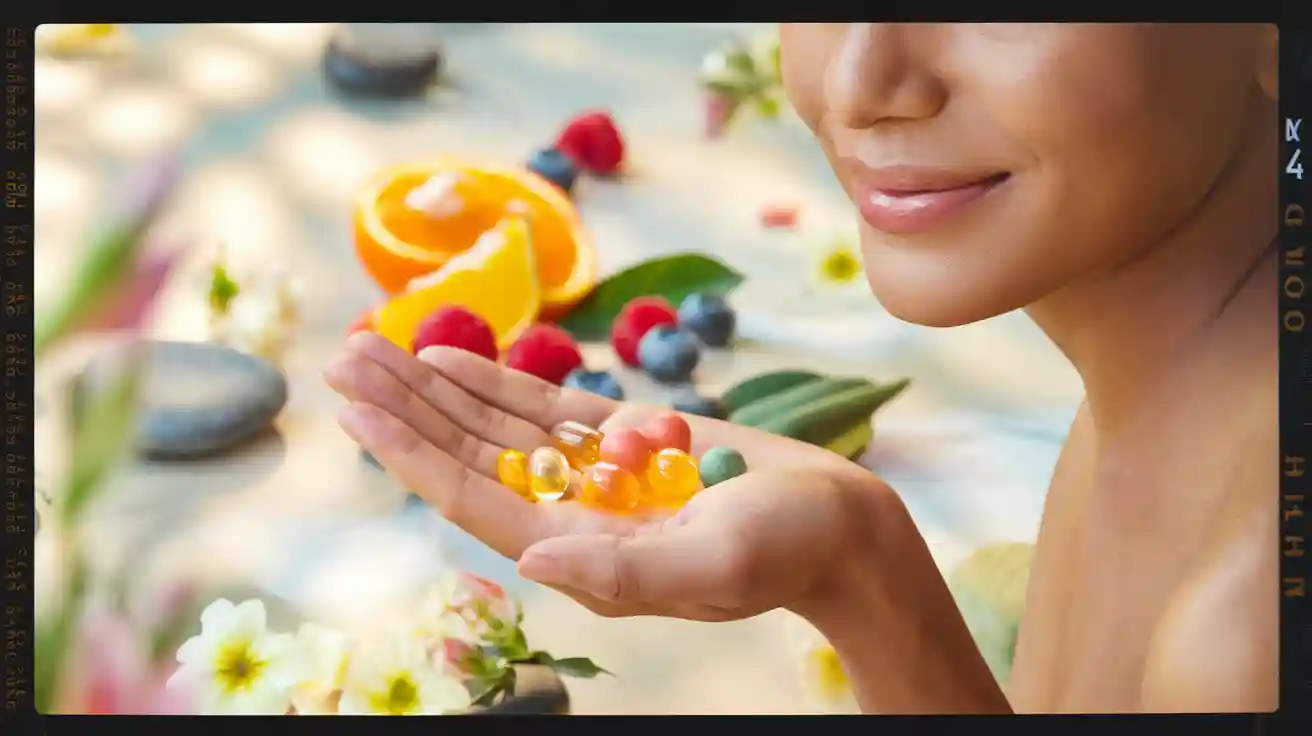
Want radiant skin and a natural glow? You need the best vitamins for skin. Vitamin C boosts collagen and protects you from free radicals. Vitamin A smooths your skin and helps with tone. Vitamin E calms irritation and shields you from damage. Vitamin D supports cell repair. Vitamin B12, especially with ATP, shows real results—recent studies found significant improvements in skin radiance and hydration in just four weeks. You can see your skin become more radiant and glowing by choosing the right vitamins. Ready to feel confident with glowing skin?
Here’s a quick look at the best vitamins and their top benefits:
| Vitamin | Key Benefit |
|---|---|
| Vitamin C | Brightens and improves radiance |
| Vitamin A | Smooths texture and tone |
| Vitamin E | Soothes and protects |
| Vitamin D | Repairs and rejuvenates |
| Vitamin B12 | Boosts radiance and hydration |
- These vitamins help you get radiant skin and keep it glowing all year.
Best Vitamins for Radiant Skin
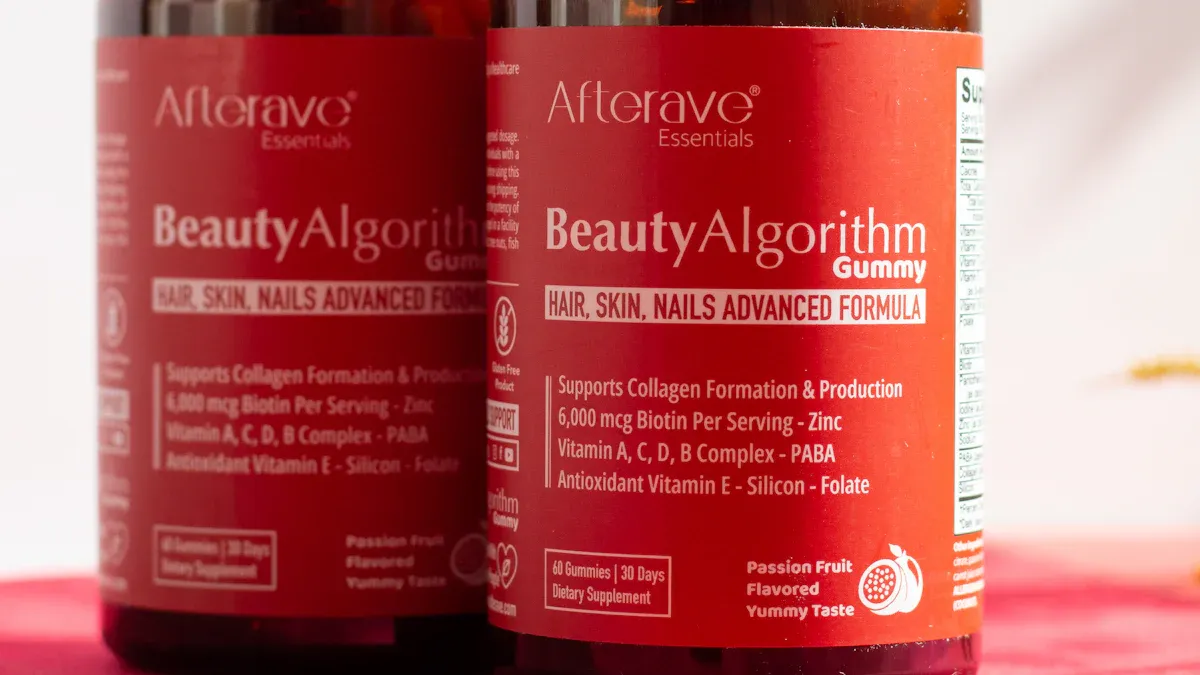
Vitamin C
You want a radiant complexion? Vitamin C is your go-to for brightening ingredients and age-defying action. This vitamin helps your skin look more radiant by boosting collagen, which keeps your skin firm and smooth. Vitamin C and antioxidants work together to fight free radicals from pollution and sunlight, so your skin stays protected and glowing.
- Clinical studies show that using vitamin C daily for at least three months can improve wrinkles, skin texture, and overall appearance.
- Vitamin C also helps fade dark spots by stopping extra pigment from forming, so you get a more even skin tone with less irritation.
- When you pair vitamin C and antioxidants like vitamin E and ferulic acid, you get even better protection from redness and UV damage.
- Newer products use vitamin C in liposomes or microneedle patches, which help it reach deeper layers for more radiant skin.
The recommended daily intake for adults is 90 mg for men and 75 mg for women, but some experts suggest up to 400 mg for those who want extra protection against skin aging. Vitamin C is essential for collagen production, which keeps your skin elastic and helps it heal faster. If you want glowing skin, make sure you get enough vitamin C every day.
| Category | Vitamin C Intake (mg/day) |
|---|---|
| Adult Men (19+ yrs) | 90 |
| Adult Women (19+ yrs) | 75 |
| Pregnant Women | 85 |
| Lactating Women | 120 |
| Smokers | +35 mg above non-smokers |
Vitamin A
Vitamin A is a powerhouse for smoother, more even skin. You might know it as retinol or retinoids in your skincare products. This vitamin helps your skin renew itself faster, so you see fewer fine lines and less roughness. It also fades dark spots and helps with uneven skin tone, making your complexion look more radiant.
- Topical retinoids can make your skin look smoother and reduce wrinkles and hyperpigmentation.
- Vitamin A boosts collagen, which keeps your skin firm and age-defying.
- It also helps exfoliate dead skin cells, so your skin glows and feels softer.
- Dermatologists recommend vitamin A for acne, which means clearer, glowing skin for you.
You can get vitamin A from foods like beef liver, sweet potatoes, spinach, carrots, and red bell peppers. These foods give you both animal and plant forms of vitamin A, supporting your skin health from the inside out.
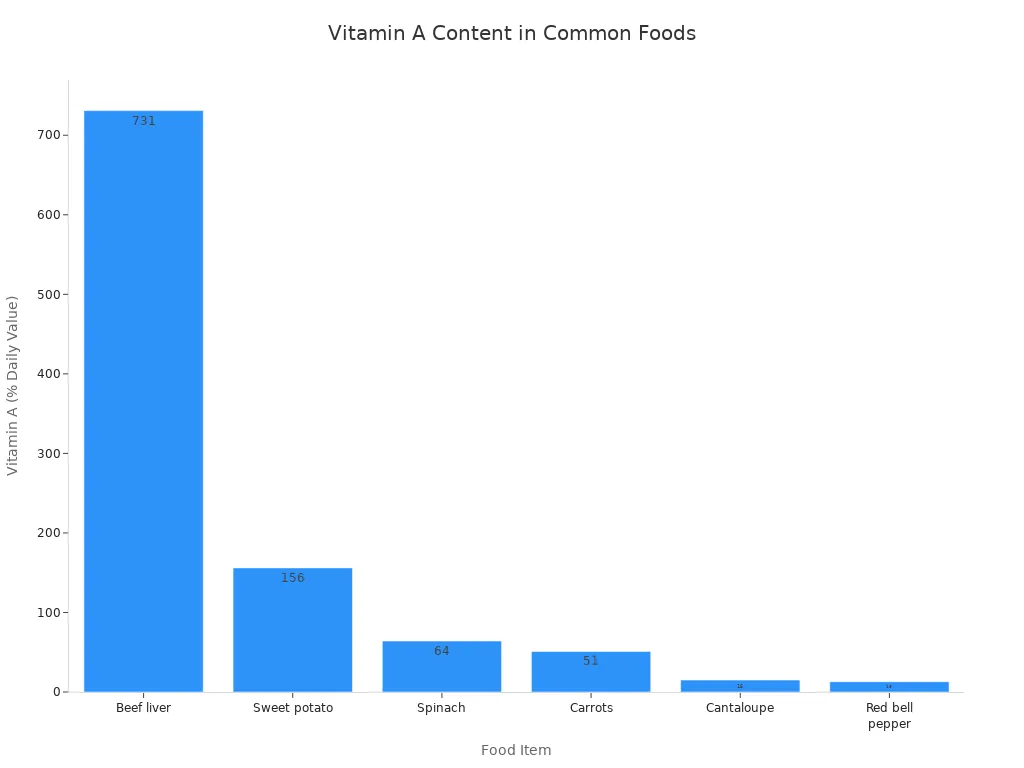
Vitamin E
Vitamin E is one of the best antioxidants for your skin. It helps protect your skin from damage caused by the sun, pollution, and other stressors. This vitamin soothes irritation, calms redness, and keeps your skin barrier strong. If you have dry or sensitive skin, vitamin E can help lock in moisture and make your skin feel softer.
- Topical vitamin E works well to reduce inflammation and free radical damage.
- When you use vitamin E with vitamin C and antioxidants, you get even more protection and moisture.
- Clinical trials show that vitamin E can improve skin hydration, reduce water loss, and help with conditions like atopic dermatitis.
You can find vitamin E in moisturizers, serums, and foods like nuts, seeds, and leafy greens. It’s a must-have for anyone who wants glowing skin and a radiant look.
Vitamin D
Vitamin D is not just for your bones—it’s also important for radiant skin. This vitamin helps your skin repair itself and supports your immune system, so you get fewer breakouts and less redness. Vitamin D also helps your skin barrier stay strong, which means less dryness and irritation.
You can get vitamin D from fatty fish like salmon, sardines, and mackerel, as well as fortified foods, egg yolks, beef liver, and UV-exposed mushrooms. If you don’t get much sun, you might need a supplement to keep your skin healthy and glowing.
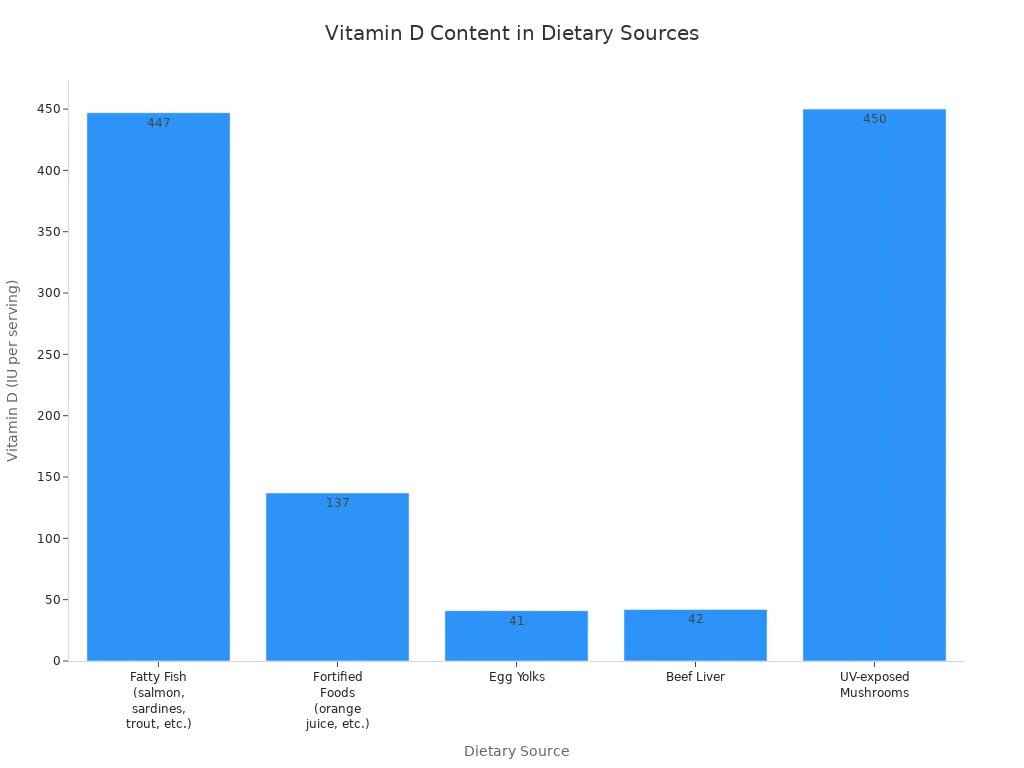
Niacinamide (B3)
Niacinamide, also called vitamin B3, is a favorite for anyone who wants a brighter, more even complexion. This vitamin helps reduce dullness by stopping too much melanin from forming, so your skin looks more radiant. It also fights oxidative stress and inflammation, which can make your skin look tired.
- Niacinamide strengthens your skin barrier, helping it hold onto moisture and stay protected from the environment.
- Clinical studies show that using a 5% niacinamide cream twice a day for 8-12 weeks can reduce dark spots, redness, and rough texture.
- It’s gentle enough for sensitive skin and works well with other antioxidants.
If you want glowing skin without irritation, niacinamide is a smart choice.
Vitamin B5
Vitamin B5, also known as pantothenic acid, is a hydration hero. It acts as a humectant, pulling moisture into your skin and keeping it there. This vitamin helps your skin heal, supports collagen production, and makes your skin feel softer and plumper.
- Studies show that vitamin B5 can reduce oiliness, shrink pores, and help heal pimples in just a few weeks.
- It also helps regulate sebum, so your skin stays clear and glowing.
- When used in lotions with other vitamins, vitamin B5 improves skin texture and reduces pigmentation.
You can get vitamin B5 from foods like mushrooms, avocados, eggs, broccoli, and chicken. Adding this vitamin to your routine can give you a healthy, radiant glow.
Vitamin F
Vitamin F isn’t a single vitamin—it’s a group of essential fatty acids, mainly linoleic and alpha-linolenic acid. These fatty acids are key for keeping your skin barrier strong and healthy. When your skin barrier works well, your skin holds onto moisture and stays protected from irritants.
- Vitamin F helps prevent dry, flaky skin and reduces redness and irritation.
- It’s safe for acne-prone skin and helps calm inflammation.
- Topical vitamin F can restore your skin barrier in just a few days, making your skin look and feel more radiant.
You’ll find vitamin F in foods like fatty fish, walnuts, sunflower seeds, and vegetable oils. These foods help your skin stay elastic, hydrated, and glowing.
Biotin
Biotin, or vitamin B7, supports the production of fatty acids that keep your skin barrier strong and hydrated. If you don’t get enough biotin, your skin can become dry and irritated. For most people, though, extra biotin doesn’t make your skin glow more unless you have a deficiency. Too much biotin can even cause breakouts by messing with other B vitamins.
- Biotin is important for energy production and fatty acid formation, which nourish your skin.
- Experts say a balanced diet with biotin-rich foods is better than supplements for most people.
You can get biotin from beef liver, cooked eggs, salmon, avocados, sweet potatoes, nuts, and seeds. Focus on a healthy diet and a good skincare routine for natural, glowing skin.
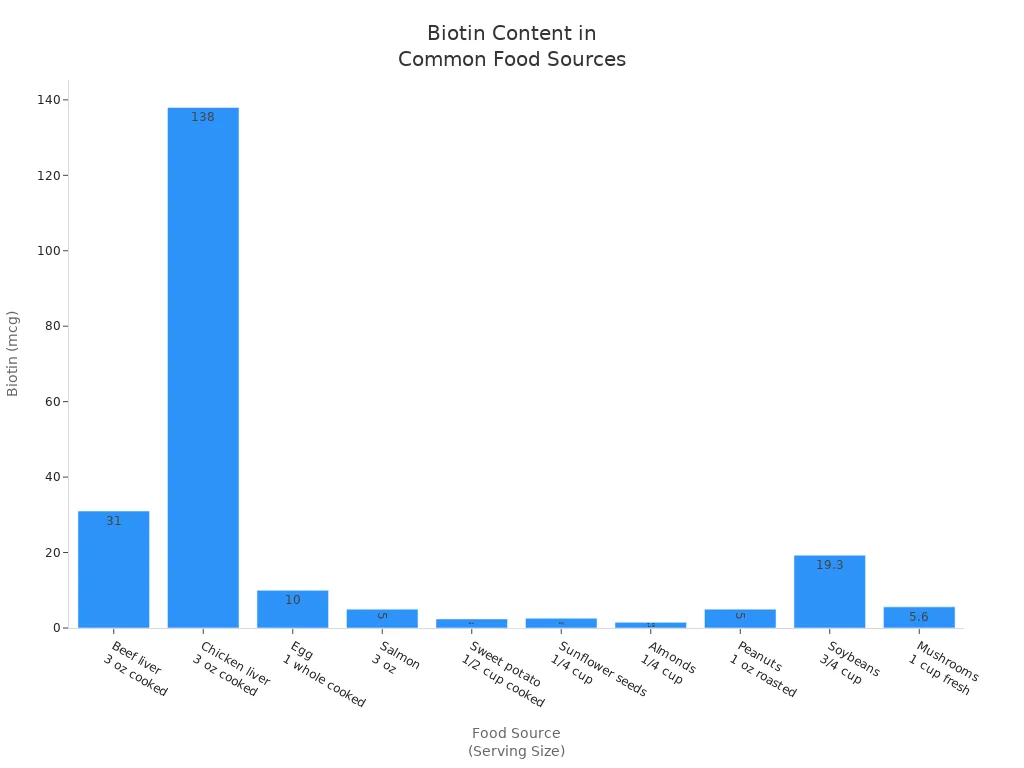
Vitamin K
Vitamin K is a secret weapon for reducing dark circles, bruising, and redness. This vitamin helps your blood vessels stay strong and supports healing, so your skin looks more even and radiant.
- Vitamin K2 keeps your skin youthful by preventing elastin from breaking down.
- Topical vitamin K creams can reduce dark circles and bruising, especially after cosmetic treatments.
- It also calms inflammation, helping with conditions like eczema and rosacea.
You’ll find vitamin K in leafy greens like kale, collard greens, spinach, broccoli, and Brussels sprouts. Eating these foods with healthy fats helps your body absorb more vitamin K, giving your skin a radiant boost.
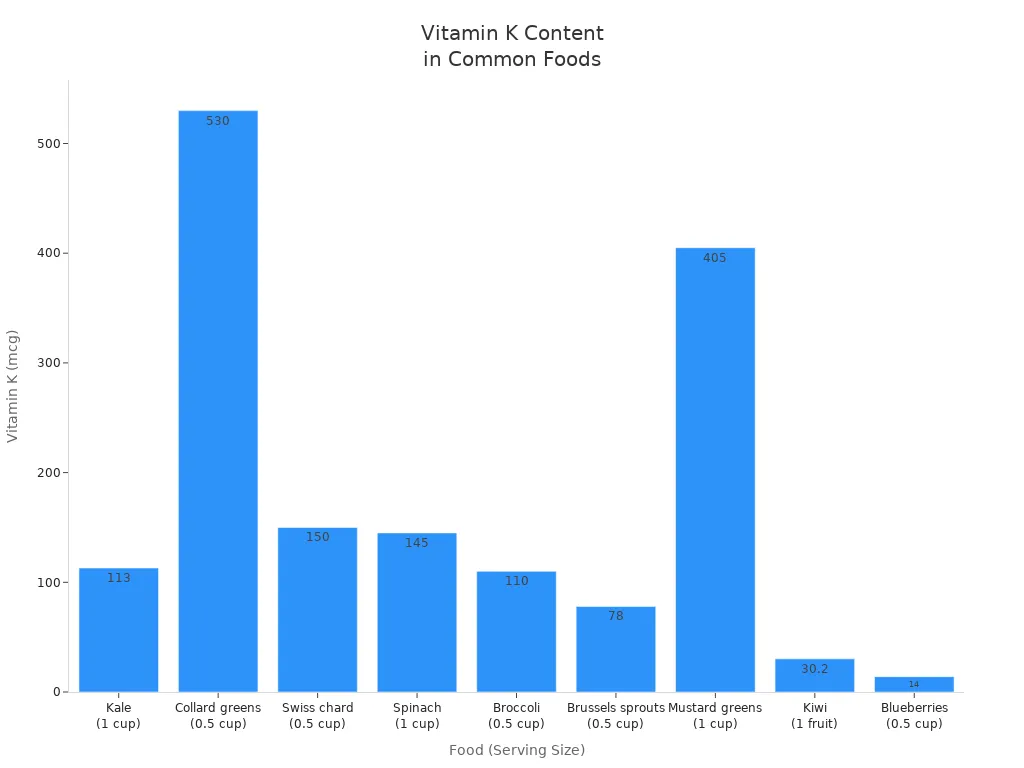
Tip: For the best results, combine these vitamins with a balanced diet and a simple skincare routine. Your skin will thank you with a healthy, radiant glow!
Vitamin Sources
Foods
You can get glowing skin by eating the right foods every day. Many fruits, veggies, nuts, and fish give your skin the vitamins it needs to look its best. Here’s a quick table to help you find the best foods for each vitamin:
| Vitamin / Mineral | Role in Skin Health | Nutrient-Dense Food Sources |
|---|---|---|
| Vitamin C | Collagen, brightens, antioxidant | Citrus fruits, strawberries, kiwis, bell peppers, leafy greens |
| Vitamin D | Repairs, soothes, supports immune system | Fatty fish, fortified foods, egg yolks, mushrooms |
| Vitamin E | Hydrates, protects, calms | Almonds, sunflower seeds, spinach, avocados |
| Vitamin A | Smooths, renews, clears | Sweet potatoes, carrots, dark leafy greens |
| Biotin (B7) | Hydrates, repairs barrier | Eggs, fish, nuts, seeds, leafy greens |
| Vitamin K | Reduces dark circles, heals | Kale, spinach, broccoli, Brussels sprouts |
| Omega-3s | Moisturizes, reduces redness | Fatty fish, walnuts, avocados |
You can boost your skin’s glow by eating a mix of these foods. Try adding bell peppers and strawberries for natural sources of vitamin c. Snack on walnuts or sunflower seeds for healthy fats and vitamin E. Sweet potatoes and carrots give you vitamin A for smooth skin. Leafy greens like spinach and kale help with hydration and healing.
Tip: Eat a rainbow of fruits and veggies every day. This gives your skin a steady supply of antioxidants and vitamins.
Supplements
Sometimes, you may not get enough vitamins from food alone. Supplements can help fill the gaps, but you need to choose wisely. Here are some tips to help you pick the best ones:
- Look for multivitamins that cover 100% of your daily needs for vitamins A, C, D, E, and biotin.
- Choose vitamin c supplements with at least 500 mg if you want extra support for collagen and brightening.
- Pick vitamin D supplements if you spend little time in the sun or have darker skin.
- Check for added antioxidants like zinc and selenium, which help protect your skin from damage.
- Read labels and avoid mega-doses. More is not always better, and too much of one vitamin can cause problems.
- If you have sensitive skin, try supplements with hyaluronic acid or omega-3s for extra hydration.
Note: Always talk to your doctor before starting new supplements, especially if you take other medicines or have health conditions.
Supplements work best when you use them with a healthy diet. They can help you get the benefits of vitamin c, vitamin D, and other key nutrients for radiant skin.
Radiant Skin Routine

Oral and Topical Use
You want your skin to look its best? Try using both oral supplements and topical products. This combo helps you get a real glow. When you take vitamins like vitamin C and vitamin E by mouth, they work from the inside. They help your body fight damage and keep your skin healthy. But sometimes, oral vitamin C alone does not give strong protection against the sun.
Topical products can boost your results. When you put vitamin C and vitamin E directly on your skin, you get more protection from UV rays and pollution. These antioxidants help your skin barrier stay strong and reduce redness. New creams and serums use special ways to deliver vitamin C deeper, so you see more glow and fewer dark spots.
Here’s why combining oral and topical vitamins works so well:
- Oral vitamin C and E together help protect your skin from sun damage better than just one alone.
- Topical vitamin C with vitamin E and ferulic acid gives even more protection and helps your skin look brighter.
- Using both methods gives you the best chance for glowing skin and a healthy skin barrier.
Daily Tips
Want to keep your glow all day? Try these easy steps:
- Wash your face every night to remove dirt, oil, and sunscreen. Clean skin lets vitamins work better.
- Use a gentle vitamin C serum in the morning. This brightens your skin and protects it from the sun.
- Apply sunscreen with at least SPF 30 every day. Sun protection keeps your glow and stops early aging.
- Eat foods rich in vitamin A, vitamin E, and vitamin D. These help your skin renew, stay soft, and repair itself.
- Adjust your routine for your skin’s needs. If your skin feels dry, add a moisturizer with vitamin E or vitamin F.
- Drink water and get enough sleep. Healthy habits make your skin look fresh and glowing.
Tip: A balanced routine with the right vitamins, good food, and smart skincare helps you get glowing skin that lasts.
Synergy and Safety
Combining Vitamins
You might wonder if taking more than one vitamin helps your skin glow. The answer is yes! When you combine vitamins, you get better results for your skin health than using just one. For example, vitamin c and antioxidants like vitamin E and selenium work together to protect your skin from damage. Vitamin c helps regenerate vitamin E, so your skin gets extra defense against pollution and sunlight.
Here are some ways vitamins team up for radiant skin:
- Vitamins A, C, and E, along with minerals like zinc and selenium, improve skin firmness, hydration, and thickness.
- Carotenoids with vitamin E and selenium boost skin density and reduce roughness.
- B vitamins, such as niacinamide, support energy and help your skin repair itself.
- Vitamin c and antioxidants protect your skin from UV rays and help fade dark spots.
Tip: You get the most benefit when you eat a variety of foods rich in vitamins and antioxidants. Your skin will look smoother, firmer, and more hydrated.
Common Mistakes
You want to avoid problems when using vitamins for your skin. Some vitamins can compete for absorption, so spacing them out during the day helps. For example, vitamin c and B12 work best when you take them a few hours apart. Zinc can lower copper levels, so you need a balanced ratio. Calcium can block magnesium, iron, and zinc if you take them together.
Watch out for these common mistakes:
- Taking too much of fat-soluble vitamins (A, D, E, K) can cause toxicity and harm your liver or kidneys.
- High doses of vitamin A may lead to skin peeling and other health issues.
- Too much vitamin E can increase bleeding risk, especially if you use blood thinners.
- Large amounts of vitamin C may raise your chance of kidney stones.
- Multivitamins sometimes have fillers or too much of certain nutrients. Always check the label.
Note: Talk to your doctor before starting new supplements, especially if you take medicine or have health concerns. Safe use of vitamins and antioxidants keeps your skin healthy and glowing.
Supporting Habits
Minerals
You can boost your skin’s glow by adding the right minerals to your routine. Zinc, selenium, and copper work with vitamins to protect your skin from damage. Zinc helps your skin heal and keeps it strong. Selenium and copper, when taken with vitamins, help guard your skin against sunburn and support skin protection. These minerals also help your skin fight off free radicals, which can cause aging.
| Mineral | How It Helps Your Skin | Works Best With |
|---|---|---|
| Zinc | Repairs and protects | Vitamins A, C, E |
| Selenium | Fights UV damage | Vitamin complex |
| Copper | Boosts healing | Selenium, vitamins |
Tip: Eat foods like nuts, seeds, seafood, and whole grains to get these minerals naturally.
Hydration
Your skin needs water to look fresh and healthy. When you drink enough water, your skin stays plump and soft. Water helps your body move vitamins and minerals to your skin cells. Try to drink water throughout the day. You can also eat water-rich foods like cucumbers, oranges, and watermelon.
- Staying hydrated helps your skin absorb nutrients better.
- Water flushes out toxins that can dull your glow.
Sleep
Getting enough sleep is one of the best things you can do for your skin. When you sleep, your body repairs itself. Your skin makes new cells and heals damage from the day. Aim for 7–9 hours each night. Good sleep helps your skin look brighter and less puffy.
Note: Poor sleep can make your skin look tired and slow down healing.
Sun Protection
You need to protect your skin from the sun every day. UV rays can cause wrinkles, dark spots, and even skin cancer. Use a mineral-based sunscreen with at least SPF 30. Wear a hat and sunglasses when you go outside. Sun protection keeps your skin looking young and healthy.
Aloe Vera
Aloe vera is a natural way to soothe and brighten your skin. You can use aloe gel after sun exposure or when your skin feels dry. Aloe helps calm redness and gives your skin a soft, dewy glow. It works well with your vitamin routine for extra radiance.
Try keeping an aloe plant at home for fresh gel anytime you need a boost!
You now know the top vitamins for radiant skin and how they work together to keep your skin firm, hydrated, and bright. Vitamin C stands out for boosting collagen and helping your skin repair, while vitamin E, vitamin D, zinc, and selenium add extra support. When you stick with a balanced routine—good food, hydration, sun protection, and gentle care—you help your skin glow from the inside out. Start your radiant journey today and enjoy healthy, vibrant skin all year!
FAQ
What vitamin makes your skin glow the most?
Vitamin C gives your skin the brightest glow. It helps your skin look fresh and even. You can use it in serums or eat foods like oranges and strawberries. Try adding it to your routine for a quick boost.
Can I take all these vitamins together?
You can take most skin vitamins together, but you should not take high doses without talking to your doctor. Some vitamins work better in pairs, like C and E. Always check the label and follow the recommended amounts.
How long does it take to see results?
You may notice a glow in about 4 to 8 weeks if you use vitamins daily. Your skin needs time to renew. Stay patient and keep up your routine for the best results.
Do I still need sunscreen if I take skin vitamins?
Yes! Vitamins help your skin, but they do not replace sunscreen. You need sunscreen every day to protect your skin from sun damage and keep your glow.

Poseidon
Master of Nutritional Epidemiology, University of Copenhagen, Herbal Functional Nutrition Researcher
Focus: The scientific application of natural active ingredients such as Tongo Ali, Horny Goat Weed, and Maca to sexual health and metabolic regulation.
Core Focus:
Men: Use a combination of Tongo Ali (an energizing factor) + Maca (an energy reserve) to improve low energy and fluctuating libido.
Women: Use a combination of Horny Goat Weed (a gentle regulator) + Maca (a nutritional synergist) to alleviate low libido and hormonal imbalances.
Stressed/Middle-Aged Adults: This triple-ingredient synergy supports metabolism, physical strength, and intimacy.
Product Concept:
Based on traditional applications and modern research (e.g., Tongo Ali promotes testosterone-enhancing enzyme activity, and icariin provides gentle regulation), we preserve core active ingredients and eschew conceptual packaging—using natural ingredients to address specific needs.
Simply put: I'm a nutritionist who understands "herbal actives." I use scientifically proven ingredients like Tongo Ali, Epimedium, and Maca to help you make "sexual health" and "nutritional support" a daily routine.
